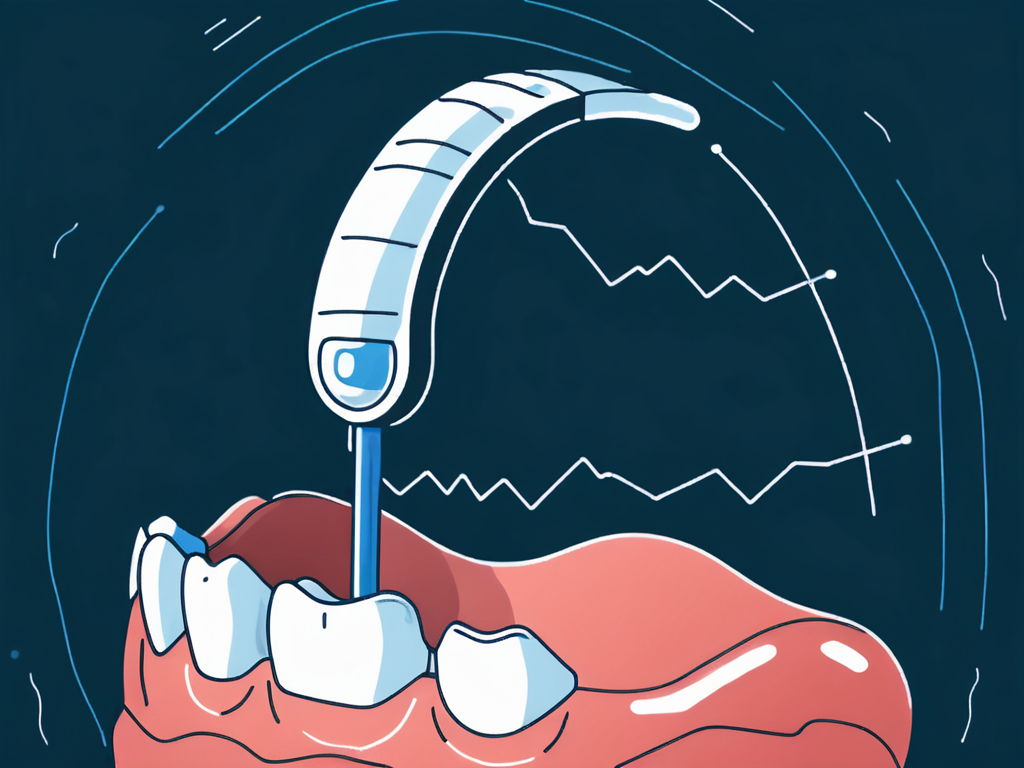Biting your tongue while sleeping can be a distressing and painful experience. It can not only disrupt your sleep but also lead to potential health risks. Understanding the causes of tongue biting in sleep is crucial in finding effective preventive measures. Moreover, learning coping mechanisms and knowing when to seek professional help are essential for managing this condition.
Understanding the Causes of Tongue Biting in Sleep
Tongue biting in sleep can be attributed to various factors, including medical conditions and psychological factors.

Medical Conditions Leading to Tongue Biting
Some individuals may experience tongue biting due to certain medical conditions. These conditions can make one more prone to involuntary movements during sleep, resulting in tongue biting. For example, sleep disorders such as sleep apnea, restless leg syndrome, and Bruxism (teeth grinding) can contribute to tongue biting incidents.
Moreover, other medical conditions like temporomandibular joint (TMJ) disorders or neurological disorders can also play a role in tongue biting during sleep. TMJ disorders can cause misalignment of the jaw, leading to abnormal movements that may result in accidental biting of the tongue. Neurological disorders affecting motor control can increase the likelihood of tongue biting episodes as well.
Psychological Factors Contributing to Tongue Biting
Psychological factors, such as stress, anxiety, and REM sleep behavior disorder, can influence tongue biting in sleep. Stress and anxiety often manifest in physical actions during sleep, including biting the tongue. Additionally, individuals with REM sleep behavior disorder may act out their dreams, leading to unintentional tongue biting.
Furthermore, certain medications that affect sleep patterns or muscle relaxation can also be a contributing factor to tongue biting. Sedatives, antidepressants, or antipsychotic medications may alter the normal sleep cycle, potentially increasing the chances of tongue biting incidents. It is essential to consult with a healthcare provider if tongue biting during sleep becomes a persistent issue, as they can provide a comprehensive evaluation and recommend appropriate treatment options.
The Impact of Tongue Biting on Sleep Quality
Biting your tongue in your sleep can have significant repercussions on the quality of your sleep and overall well-being.
Many people are unaware that tongue biting during sleep can be a common symptom of various sleep disorders, such as bruxism (teeth grinding) or sleep apnea. These conditions can exacerbate the likelihood of tongue biting incidents, further impacting your sleep quality.
Disruptions in Sleep Patterns
Tongue biting episodes can disrupt your sleep patterns, leading to frequent awakenings and fragmented sleep. These interruptions prevent you from reaching the deeper stages of sleep necessary for restorative rest.
Moreover, the physical act of biting down on your tongue can trigger a stress response in your body, causing a release of adrenaline and cortisol. This physiological reaction can further disturb your sleep, making it harder to fall back asleep after a tongue biting episode.
Potential Health Risks
Repeated biting of the tongue can lead to injuries, sores, and infections. The continuous trauma from tongue biting can also cause discomfort and pain, affecting your ability to eat, drink, and speak. If left untreated, these injuries may become more severe, resulting in complications.
Furthermore, the presence of open wounds in the mouth from tongue biting can increase the risk of bacterial infections, especially if proper oral hygiene is not maintained. These infections can lead to additional health issues, such as oral thrush or cellulitis, if the tongue biting behavior persists.
Prevention Strategies for Tongue Biting in Sleep
Preventing tongue biting during sleep involves a combination of lifestyle changes and medical interventions.

Many people are unaware of the potential causes of tongue biting during sleep. It can be triggered by various factors, including sleep disorders like sleep apnea, teeth grinding (bruxism), or even certain medications. Understanding the root cause of your tongue biting can help tailor prevention strategies to effectively address the issue.
Lifestyle Changes to Consider
You can reduce the likelihood of tongue biting by implementing certain lifestyle modifications. These may include stress management techniques, practicing good sleep hygiene, and avoiding stimulating substances such as caffeine and nicotine before bed. Maintaining a consistent sleep schedule and ensuring a comfortable sleep environment can also aid in preventing tongue biting incidents.
Furthermore, incorporating relaxation practices before bedtime, such as meditation or gentle yoga, can help calm both the mind and body, reducing the chances of involuntary tongue biting. Additionally, keeping hydrated throughout the day can prevent dry mouth, which is often associated with increased tongue biting during sleep.
Medical Interventions and Treatments
If lifestyle changes alone do not yield satisfactory results, consult with a healthcare professional for potential medical interventions or treatments. Depending on the underlying cause, a doctor may recommend therapies such as oral appliances or continuous positive airway pressure (CPAP) machines to manage sleep disorders associated with tongue biting. In severe cases, surgical interventions may be necessary.
It's crucial to undergo a thorough evaluation by a healthcare provider to determine the most appropriate course of action. Seeking timely medical advice can not only alleviate tongue biting episodes but also improve overall sleep quality and well-being.
Coping Mechanisms for Tongue Biting
While working towards prevention, it is essential to develop effective coping mechanisms to manage tongue biting incidents. Understanding the triggers that lead to tongue biting can help in creating personalized strategies to address the issue.

One additional coping mechanism that can be beneficial is practicing mindfulness and relaxation techniques. Stress and anxiety are common factors that contribute to tongue biting episodes. By incorporating deep breathing exercises, meditation, or yoga into your daily routine, you can reduce tension and potentially decrease the likelihood of tongue biting incidents.
Pain Management Techniques
If you accidentally bite your tongue during sleep, there are pain management techniques you can employ to alleviate discomfort. Rinsing your mouth with warm saltwater, applying a cold compress to the affected area, and using over-the-counter pain relievers can provide temporary relief. It is crucial to monitor the healing process and seek further medical attention if needed.
Healing and Recovery Process
Healing from tongue biting injuries requires patience and care. Focus on maintaining good oral hygiene and consuming soft, non-irritating foods to aid in healing. Avoid further damage by refraining from biting your tongue intentionally or unintentionally.
Additionally, staying hydrated is essential for the recovery process. Adequate hydration supports overall healing and can prevent dryness in the mouth, which may exacerbate discomfort from tongue biting injuries. Remember to drink plenty of water throughout the day to promote optimal healing.
When to Seek Professional Help
Understanding the nuances of tongue biting during sleep can be crucial in determining when professional help is necessary. It's essential to pay attention to the frequency and severity of these incidents, as well as the impact they have on your overall well-being. While some cases may be mild and infrequent, persistent or severe episodes could indicate an underlying issue that requires expert intervention.
Recognizing Severe Symptoms
If tongue biting episodes become frequent, severe, or cause significant distress, it is important to seek professional help. Other concerning symptoms may include excessive bleeding, persistent pain, or signs of infection.
In addition to these symptoms, it's important to consider any underlying conditions that may contribute to tongue biting during sleep. Factors such as sleep disorders, stress, or medication side effects can exacerbate this behavior, making it crucial to address the root cause with the help of a healthcare provider.
In conclusion, understanding the causes, impact, prevention strategies, coping mechanisms, and when to seek professional help play critical roles in managing and preventing tongue biting in sleep. By adopting preventive measures and seeking appropriate guidance, you can improve sleep quality and minimize the discomfort caused by tongue biting episodes.
If you're struggling with tongue biting during sleep and are looking for a reliable solution, consider exploring the custom mouth guards offered by Remi. Our mouth guards are designed to provide a perfect fit, tailored to your unique dental profile, and can significantly reduce the risk of tongue biting and teeth grinding. With Remi's mouth guards, you can enjoy up to 80% savings compared to traditional options, and the convenience of our at-home impression kit means you can achieve professional-grade protection without the hassle. Join The Remi Club today for regular deliveries and additional savings on your custom mouth guards. Experience the difference in quality, comfort, and affordability with Remi's dental-grade, BPA-free products. Don't let tongue biting disrupt another night's sleep—Shop Now and take the first step towards a better, more restful sleep experience.













